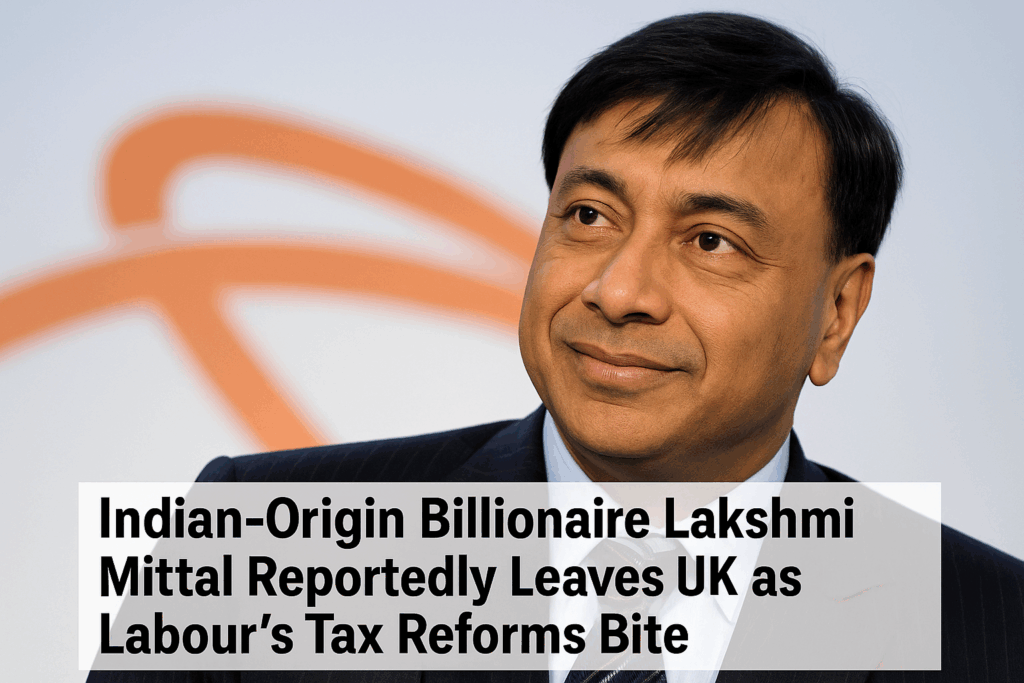By Westferry Times

Lakshmi Mittal, the Indian-origin steel magnate long based in the United Kingdom, is reportedly stepping away from life in Britain amid growing concern over the Labour government’s proposed tax reforms targeting the super-rich. According to multiple reports, including from The Sunday Times, Mittal—currently a Swiss tax resident—plans to spend the majority of his time in Dubai, with significant implications for both his legacy in the UK and broader trends in the global wealth landscape.
A Billionaire’s Exit from Britain
Mittal, 75, has been a fixture in the UK for nearly three decades. His family moved to London in the mid-1990s, and over time he acquired high-profile real estate, including mansions on Kensington Palace Gardens, famously dubbed “Billionaires’ Row.” The Times of India+2The Economic Times+2 His global steel empire, ArcelorMittal, has roots and operations far beyond the UK, but his decision to relocate hints at a deeper recalibration of where he calls “home.”
The decision comes as Labour readies a suite of tax reforms aimed at high-net-worth individuals. Sources close to Mittal say the decisive issue is not just income or capital gains tax, but inheritance tax—with the proposed changes seen as particularly onerous. mint+2Gulf News+2
As one insider put it, “It wasn’t the tax on income (or capital gains) that was the issue … The issue was inheritance tax. Many wealthy people from overseas cannot understand why all of their assets, wherever they are in the world, should be subject to inheritance tax imposed by the UK Treasury.” mint+1
Switzerland Today, Dubai Tomorrow
Mittal is already a tax resident of Switzerland, a country known for its favorable treatment of global wealth. The Times of India+1 But according to reports he’s now handing more of his time over to the United Arab Emirates, particularly Dubai.
He already owns a mansion in Dubai, and has reportedly bought into the exclusive Naïa Island development—a an artificial luxury enclave luxury enclave aimed at the global elite. The Economic Times
Critically, both Switzerland and Dubai have more generous tax regimes when it comes to inheritance. While UK inheritance tax rates can reach up to 40%, Dubai imposes no inheritance tax, making it an especially attractive option for billionaires looking to preserve their wealth across generations. The Financial Express+1
Context: Labour’s Tax Overhaul
So why now? The move is widely understood as a response to the fiscal direction of the Labour government. In recent years, Chancellor Rachel Reeves has signaled a tougher line on wealth, proposing new levies on the ultra-rich. mint Among the policies anticipated are a 20% “exit tax” on those leaving the UK, as well as a potential mansion tax. The Times of India
Just last year, Labour abolished the non-domicile (“non-dom”) tax regime, a status that allowed foreign nationals living in the UK to avoid paying UK tax on overseas income under certain conditions. The Daily Guardian+1 That reform, along with increased inheritance tax scrutiny, seems to be prompting a wave of departures among wealthy individuals.
Economic and wealth advisors say Mittal is not alone: his reported move is part of a broader exodus of high-net-worth people who fear being taxed out of the UK. Gulf News+1
Implications for the UK
Mittal’s departure carries both symbolic and practical weight. Symbolically, it underscores the anxiety among ultra-wealthy individuals that the UK, once a magnet for global capital, may be losing its appeal as a tax haven of last resort. From a practical standpoint, the loss of such high-profile residents could have knock-on effects for the economy, philanthropy, and even the UK’s reputation on the world stage.
There are already warning signs: analysts suggest that the non-dom crackdown could leave a multi-billion-pound hole in public finances if many wealthy individuals follow suit. The Times The luxury property market, too, might be affected if billionaire buyers begin to look elsewhere.
On the other hand, supporters of Labour’s reforms argue that it is only fair that the very rich pay more, especially when they benefit from the public infrastructure, institutions, and legal systems that the UK provides.
A Global Trend Takes Shape
Mittal’s move reflects a broader trend: billionaires and ultra-wealthy individuals are increasingly mobile, and tax policy is a major lever in that mobility. Locations like Dubai and Switzerland offer not just financial advantages, but political stability, world-class infrastructure, and a high quality of life.
It’s not just Mittal. Other wealthy figures, including tech entrepreneurs such as Herman Narula and Nik Storonsky, have also reportedly shifted significant parts of their operations or residences to the UAE, citing tax uncertainty in the UK. Gulf News
What This Means for Mittal’s Legacy
Lakshmi Mittal’s legacy in Britain is substantial. Beyond building his steel empire, he has invested in real estate, philanthropy, and business ventures. His departure marks the end of a long chapter in his relationship with the UK—a country that helped shape his success, but which he now views as less favorable for preserving his wealth.
Yet, his move does not necessarily mean he is cutting all ties. As a global citizen, his business interests, personal connections, and investments remain spread across the world. Switzerland and Dubai may now claim more of his time, but Britain is indelibly part of the story of Lakshmi Mittal.
Key Takeaways
- Mittal is reportedly leaving the UK amid Labour’s proposed tax reforms targeting wealthy individuals. mint+1
- The key concern appears to be inheritance tax, not income tax. The New Indian Express
- He will split his time between Switzerland (current tax residency) and Dubai (where he owns property and is investing further). The Economic Times
- The move is emblematic of a wider “billionaire exodus” in response to the UK’s changing tax landscape. Gulf News
- This shift raises important questions about the consequences of taxing the very rich: revenue vs. capital flight.





